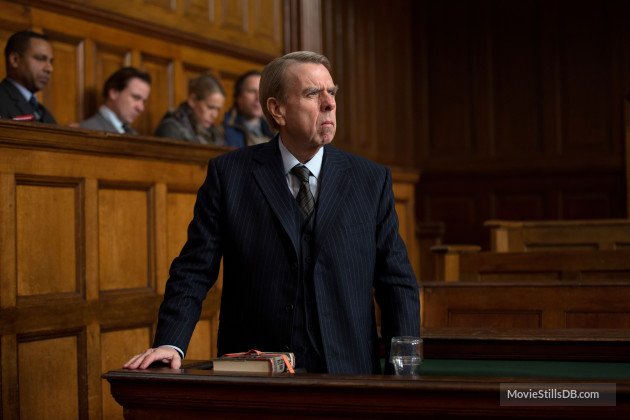Denial (2016)
CAST: Rachel Weisz, Tom Wilkinson, Timothy Spall, Andrew Scott
REVIEW:
Denial is a courtroom drama that relies less on ostentatious Oscar clip wannabe closing speeches and theatrics than meticulous cross-examination, and a true story that doesn’t embellish the material to up the ante. The result is a stately, dignified film that will bore those without an interest in the subject matter but may appeal to fans of courtroom dramas or for those with an interest in the true story.
On September 5, 1996, prominent British historian and unabashed Holocaust denier David Irving (Timothy Spall) filed a libel suit in UK courts against Jewish-American professor Deborah Lipstadt (Rachel Weisz), accusing her of damaging his academic reputation by calling him a liar in her book Denying the Holocaust. Despite some urging her to agree to a settlement and make the matter go away quietly, the outspoken Lipstadt chose to fight, assembling a British legal team led by Richard Rampton (Tom Wilkinson) and Anthony Julius (Andrew Scott), while Irving elects to act as his own lawyer. To Lipstadt’s outrage, she realizes that in British courts, the burden of proof is on her, not Irving, and her legal team will be obligated to prove the Holocaust happened. But Rampton and Julius select a different strategy: rather than questioning the Holocaust, they will put Irving himself on trial, and comb through his prolific published works and copious diary entries spanning decades to expose him as a racist and anti-Semite who deliberately falsified history to favor his own slanted perspective. But proving that Irving’s inaccuracies were deliberate distortions as opposed to honest mistakes—as is necessary to defend themselves against the libel charge—is easier said than done, and Lipstadt fears if Irving wins, it will validate Holocaust denial as a respectable opinion.
Denial deals with potentially difficult and emotional subject matter, but the film maintains a spare, reserved perspective suiting a legal drama while not completely neglecting the emotional aspect. The screenplay closely follows the facts (all dialogue in the courtroom scenes is taken verbatim from the court transcripts) and the film resists the urge for overdramatics. A more “Hollywoodized” adaptation would have ended with Lipstadt herself taking the stand for a big, rousing, righteous climactic speech, and some kind of final face-off between she and Irving, but we don’t get that here, because it’s not what happened. Lipstadt is chomping at the bit to take the stand, but that’s exactly the problem. She’s too emotional, too close to the subject matter, and doesn’t see the wisdom in her legal team’s argument that it’s facts, not feelings, that win trials. Julius also firmly shuts down her wish to call upon Holocaust survivors as witnesses for fear of Irving heckling them and causing emotional trauma (a brief video clip of Irving mocking a survivor before an applauding audience of Holocaust deniers lends credence to Julius’ concerns).
The most penetrating sequence of the movie, a visit to Auschwitz early on, strongly demonstrates this “less is more” approach. Denial doesn’t linger on graphic Holocaust imagery. A simple, silent wide-panning shot of seemingly endless piles of shoes left behind by Auschwitz’s victims is powerful and haunting without anyone needing to give any tear-jerking commentary. In fact, one of the most riveting scenes of the movie is a battle of wits and wills between Irving (on the witness stand) and the cross-examining Rampton, as Rampton tries to pin Irving down with evidence of Auschwitz’s gas chambers and Irving wriggles his way into increasingly flimsy alternative explanations. Irving’s egotistical decision to take Lipstadt to court backfires as Rampton not only tears apart his historical conclusions, but also exposes him as a dishonest and biased scholar who (despite speaking fluent German) perpetuated inaccurate translations of German-language documents relating to the Holocaust to lend them more seemingly benign meanings, took things out of context, and relied upon disreputable or debunked sources to back up his assertions. But, while his views could charitably be called misguided, Irving is not a stupid man, but a learned scholar and legal expert with decades of experience (even Lipstadt and her legal team grudgingly admit to his “riveting” courtroom presence) and media-savvy, and represents a formidable courtroom opponent.
As is necessary for this kind of dialogue-heavy docudrama where character interplay counts far more than any conventional “action”, the cast gives strong performances. Rachel Weisz (sporting a New York accent) plays Deborah Lipstadt as an impassioned woman whose outspoken sense of moral outrage sometimes makes her come across as self-righteous and abrasive (qualities which lead Rampton and Julius to keep her away from the witness stand). We side with Deborah on principle, but she’s not always the most likable personality, and Weisz doesn’t soften her edges. Tom Wilkinson is a solid uneasy ally/foil as the more level-headed Richard Rampton, an experienced elder lawyer who is not immune to emotion (he has trouble restraining his disgust toward Irving during their courtroom confrontations) but understands that it will be cold hard facts, not emotion, that wins the case. Late in the film, there is a low-key conversation between Lipstadt and Rampton where she finally comes to understand his perspective. Likewise, Andrew Scott’s Anthony Julius (whose previous claim to fame was being Princess Diana’s divorce lawyer) is pragmatic and coldly logical until showing a flash of righteous anger. Like Lipstadt, Julius is not the most sympathetic or likable individual, but we eventually come to realize he’s not as callously indifferent as he seems. Timothy Spall (probably best-known as Harry Potter‘s Wormtail) plays David Irving as both repellent and with small human shadings; we get a bit with him playing with his young daughter (whom we later learn he taught a racist poem), and at times he seems to have convinced himself of his own distortions (“But I’m not a racist,” he insists at one point with the slightly dumbfounded earnestness of someone who actually believes it, despite rather damning evidence to the contrary).
While Denial‘s script was finished before the 2016 presidential election campaign, its themes of repudiating bigotry and falsehoods in favor of incontrovertible truth takes on more resonance. It’s disquieting to recognize a glimmer of similarity between David Irving and Donald Trump, men who seem with disturbingly flippant ease to simply dismiss documented reality in favor of what Rampton calls “whatever rubbish that pops into your head”. While Irving may have been dealt a blow to his pride in court and has been discredited as a “serious” historian, he remains an active and prominent Holocaust denier with a legion of followers (Denial shows us a video clip of Irving addressing a crowd of skinheads hailing him at a neo-Nazi rally), and insidiously pervasive repellent ideologies are by no means exclusive to Nazis and/or Holocaust deniers. Denial may feature one righteous victory of historical and moral truth over agenda-driven distortions, but it was one relatively small-scale battle in an ongoing war.
* * *

